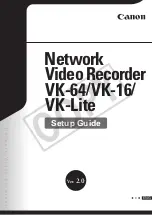
© Copyright IBM Corp. 2011
Chapter 9. Ports and Trunking
111
Link Aggregation Control Protocol
LACP Overview
Link Aggregation Control Protocol (LACP) is an IEEE 802.3ad standard for grouping
several physical ports into one logical port (known as a dynamic trunk group or Link
Aggregation group) with any device that supports the standard. Please refer to IEEE
802.3ad-2002 for a full description of the standard.
The 802.3ad standard allows standard Ethernet links to form a single Layer 2 link
using the Link Aggregation Control Protocol (LACP). Link aggregation is a method
of grouping physical link segments of the same media type and speed in full duplex,
and treating them as if they were part of a single, logical link segment. If a link in a
LACP trunk group fails, traffic is reassigned dynamically to the remaining link(s) of
the dynamic trunk group.
Note:
LACP implementation in the IBM Networking OS does not support the Churn
machine, an option used to detect if the port is operable within a bounded
time period between the actor and the partner. Only the Marker Responder is
implemented, and there is no marker protocol generator.
A port’s Link Aggregation Identifier (LAG ID) determines how the port can be
aggregated. The Link Aggregation ID (LAG ID) is constructed mainly from the
system ID
and the port’s
admin key
, as follows:
•
System ID
: an integer value based on the switch’s MAC address and the system
priority assigned in the CLI.
•
Admin key
: a port’s Admin key is an integer value (1-65535) that you can
configure in the CLI. Each switch port that participates in the same LACP trunk
group must have the same
admin key
value. The Admin key is
local significant
,
which means the partner switch does not need to use the same Admin key value.
For example, consider two switches, an Actor (the G8000) and a Partner (another
.
In the configuration shown in
, Actor switch port 7 and port 8 aggregate to
form an LACP trunk group with Partner switch port 1 and port 2.
LACP automatically determines which member links can be aggregated and then
aggregates them. It provides for the controlled addition and removal of physical links
for the link aggregation.
Each port on the switch can have one of the following LACP modes.
•
off (default)
The user can configure this port in to a regular static trunk group.
•
active
The port is capable of forming an LACP trunk. This port sends LACPDU packets
to partner system ports.
Table 12. Actor vs. Partner LACP configuration
Actor Switch
Partner Switch 1
Port 7 (admin key = 100)
Port 1 (admin key = 50)
Port 8 (admin key = 100)
Port 2 (admin key = 50)
Summary of Contents for RackSwitch G8000
Page 1: ...RackSwitch G8000 Application Guide...
Page 2: ......
Page 3: ...RackSwitch G8000 Application Guide...
Page 16: ...16 RackSwitch G8000 Application Guide...
Page 22: ...20 RackSwitch G8000 Application Guide...
Page 23: ...Copyright IBM Corp 2011 21 Part 1 Getting Started...
Page 24: ...22 RackSwitch G8000 Application Guide...
Page 54: ...52 RackSwitch G8000 Application Guide...
Page 55: ...Copyright IBM Corp 2011 53 Part 2 Securing the Switch...
Page 56: ...54 RackSwitch G8000 Application Guide...
Page 92: ...90 RackSwitch G8000 Application Guide...
Page 94: ...92 RackSwitch G8000 Application Guide...
Page 144: ...142 RackSwitch G8000 Application Guide...
Page 145: ...Copyright IBM Corp 2011 143 Part 4 Advanced Switch ing Features...
Page 146: ...144 RackSwitch G8000 Application Guide...
Page 148: ...146 RackSwitch G8000 Application Guide...
Page 182: ...180 RackSwitch G8000 Application Guide...
Page 184: ...182 RackSwitch G8000 Application Guide...
Page 212: ...210 RackSwitch G8000 Application Guide...
Page 258: ...256 RackSwitch G8000 Application Guide...
Page 286: ...284 RackSwitch G8000 Application Guide...
Page 294: ...292 RackSwitch G8000 Application Guide...
Page 298: ...296 RackSwitch G8000 Application Guide...
Page 310: ...308 RackSwitch G8000 Application Guide...
Page 311: ...Copyright IBM Corp 2011 309 Part 7 Network Management...
Page 312: ...310 RackSwitch G8000 Application Guide...
Page 320: ...318 RackSwitch G8000 Application Guide...
Page 332: ...330 RackSwitch G8000 Application Guide...
Page 334: ...332 RackSwitch G8000 Application Guide...
Page 345: ...Copyright IBM Corp 2011 343 Part 9 Appendices...
Page 346: ...344 RackSwitch G8000 Application Guide...
Page 357: ...Copyright IBM Corp 2011 Appendix C Notices 355 Taiwan Class A compliance statement...
















































